|
|
|
Sort Order |
|
|
|
Items / Page
|
|
|
|
|
|
|
| Srl | Item |
| 1 |
ID:
152893
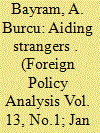

|
|
|
|
|
| Summary/Abstract |
Why do publics in donor countries support development foreign aid? Focusing on material factors, ideology, and identities, the literature has largely neglected the moral basis of foreign aid attitudes. I argue that generalized trust, defined as the belief in the integrity and trustworthiness of people, is a crucial component of the moral calculus of publics in donor countries. Using data from independently conducted surveys of global (World Values Survey) and American mass publics (Core Values Project Survey), I show that generalized trusters are more likely to aid the have-nots of the world than those who lack trust in people. This finding indicates that the bonds of trust expand the boundaries of global justice. By illuminating the role generalized trust plays in shaping donor public attitudes towards development foreign aid, this study helps improve the political economy, ideology, and identity models of aid, contributing to the literatures on foreign aid and foreign policy attitudes, and to theories of cosmopolitan global justice.
|
|
|
|
|
|
|
|
|
|
|
|
|
|
|
|
| 2 |
ID:
177450
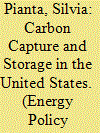

|
|
|
|
|
| Summary/Abstract |
Although Carbon Capture and Storage (CCS) technologies can potentially play an important role in climate change mitigation efforts, commercial CCS projects are still rare. Knowledge about the technical challenges of these technologies is rapidly advancing, but the challenges related to their public acceptance are still underinvestigated. Here we try to close this research gap by investigating public perceptions of CCS and public attitudes towards policies to scale up these technologies in the United States, where most existing industrial-scale CCS projects are operating. Based on a demographically representative sample of US residents, we find that awareness of CCS is very low. Using a conjoint experiment, we show that policies that outlaw the construction of new coal- and gas-fired power plants without CCS find higher public support than CCS subsidies and increases in taxes on unabated fossil fuel power generation. Public support decreases with rising costs of CCS deployment and decreasing minimal distance requirements of CCS plants from residential areas. Our results provide insights into the political feasibility of a large-scale deployment of CCS and show that specific policy design choices play an important role in influencing public support for policies to scale up these technologies.
|
|
|
|
|
|
|
|
|
|
|
|
|
|
|
|
| 3 |
ID:
165461
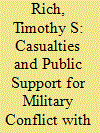

|
|
|
|
|
| Summary/Abstract |
What explains the American public’s support for military conflict with North Korea? Despite increased rhetoric, few analyses address American public opinion or whether priming the public to consider casualties influences their perceptions. The results of an experimental survey design suggest that mentioning the human cost—even without explicit references to American casualties—reduces support for American military action against North Korea but not broader perceptions of North Korea.
|
|
|
|
|
|
|
|
|
|
|
|
|
|
|
|
| 4 |
ID:
120434
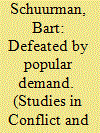

|
|
|
|
|
| Publication |
2013.
|
| Summary/Abstract |
Acquiring and maintaining public support is frequently cited as an important requirement for governments fighting non-state actors. But how exactly can public support influence the course of counterterrorism campaigns and thereby contribute to an escalation or de-escalation of violence? This article argues that public support can provide a mandate for action but that it can also set boundaries for the measures governments and their non-state adversaries can legitimately use. Fluctuations in the quantity and quality of public support for either side can expand or contract these boundaries, potentially instigating marked changes in conflict-related violence levels and affecting the efficacy of government countermeasures.
|
|
|
|
|
|
|
|
|
|
|
|
|
|
|
|
| 5 |
ID:
133294


|
|
|
|
|
| Publication |
2014.
|
| Summary/Abstract |
Large-scale deployment of low-carbon energy technologies is crucial to mitigating climate change, and public support is an important barrier to policies and projects that facilitate deployment. This paper provides insights to the origins of public opposition that can impede the adoption of low-carbon technologies by investigating how perceptions are shaped by local economic interests and individual cultural worldviews. The research considers both carbon capture and storage and wind energy technologies because they differ in maturity, economic impact and resource base. Further, for each technology, the research examines support for two types of policies: deployment in local community and public funding for research and development. Results indicate the influence of economic interests and cultural worldviews is policy specific. Individual cultural worldviews do not affect support for the deployment of technology, but they do significantly influence a person×s support for publicly funded research and development. Conversely, local economic interests have a significant role in determining support for deployment, while they do not affect support for research and development.
|
|
|
|
|
|
|
|
|
|
|
|
|
|
|
|
| 6 |
ID:
171340
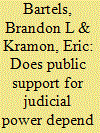

|
|
|
|
|
| Summary/Abstract |
Judicial power is central to democratic consolidation and the rule of law. Public support is critical for establishing and protecting it. Conventional wisdom holds that this support is rooted in apolitical factors and not dependent on who is in political power. By contrast, we argue that support may be driven by instrumental partisan motivations and therefore linked to partisan alignment with the executive. We test the argument with survey evidence from 34 African countries. To provide causal evidence, we conduct difference-in-differences analyses leveraging Ghana’s three presidential transitions since 2000. Across Africa, support for judicial power is high, while trust in courts is lower. However, presidential co-partisans are less supportive of horizontal judicial power over the president and more supportive of vertical power over the people. The article demonstrates the importance of partisan alignment with the executive in shaping support for judicial power, with implications for judicial behavior and legitimacy.
|
|
|
|
|
|
|
|
|
|
|
|
|
|
|
|
| 7 |
ID:
155500


|
|
|
|
|
| Summary/Abstract |
Americans think the US foreign aid budget is far too generous. Can information change those views? We identified ten prominent arguments about aid in public discussion, five positive and five negative. In a survey experiment, we exposed respondents to one of those arguments with five associated facts. Most of the arguments in favor of aid made respondents more supportive, while most of the arguments against aid made them less supportive. Arguments that focused either positively or negatively on economic development in recipient countries or advancing US interests made little difference. In contrast, arguments about the domestic costs of foreign aid or those that invoked moral considerations like recipient need or corruption had fairly large effects on attitudes. The most successful argument, on the low cost of aid, reduced aid opposition from 67 to 28 percent. When respondents saw both pro and con arguments together, however, arguments generally lost their efficacy. The only exception was the argument about the low cost of aid, which altered opinions in some ways—even when countered with anti-aid arguments. Our results are somewhat surprising given the conventional wisdom that people are motivated reasoners who reject new information that does not conform to their worldview.
|
|
|
|
|
|
|
|
|
|
|
|
|
|
|
|
| 8 |
ID:
151458
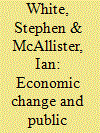

|
|
|
|
|
| Summary/Abstract |
There has been an extensive debate about the relationship between economic development and democratisation. One view is that economic development is a pre-requisite for democracy. Another view is that the emergence of democracy is largely random, and economic prosperity is important only for ensuring democracy’s survival in the event of a crisis. This essay contributes to this debate by using public opinion surveys collected over an extended period to examine patterns of economic change and public support for democracy in China and Russia. The results show that education and, to a lesser extent, social mobility and economic attitudes, play an important role in promoting pro-democracy attitudes in both countries. The results have implications for democratisation, with an increasingly large tertiary-educated middle class acting as a potential driver for democratisation in China, and for the return of a free, fair and competitive democracy in Russia.
|
|
|
|
|
|
|
|
|
|
|
|
|
|
|
|
| 9 |
ID:
167320
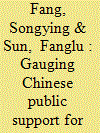

|
|
|
|
|
| Summary/Abstract |
In recent years, Beijing has significantly increased its support for UN peacekeeping operations (UNPKOs). Of the five permanent members of the Security Council, China is currently the largest troop-contributing country and the second-largest financial contributor to the UN peacekeeping budget. What is the view of the Chinese public on its country’s involvement in peacekeeping operations? We investigate the question using a public opinion survey experiment conducted in China. Our main findings are, first, that respondents showed a high level of support generally for China’s participation in peacekeeping operations but highest of all when China performed a leadership role. Secondly, China’s particular interest in a host country did not affect the degree of public support for China’s involvement; however, respondents did perceive broad benefits to China’s international reputation from such activities. Thirdly, although there was a similar level of support for China’s participation in peacekeeping whether the mission was authorised by the United Nations or by the African Union, neither was seen as a substitute for host state consent. Finally, respondents generally preferred China to make personnel (military and police) contributions in addition to financial contributions. These findings provide important insights into the domestic motivations for Beijing’s future peacekeeping policy and attendant constraints in this regard.
|
|
|
|
|
|
|
|
|
|
|
|
|
|
|
|
| 10 |
ID:
192752


|
|
|
|
|
| Summary/Abstract |
Economic costs are a central political obstacle to investing in climate change mitigation and adaptation measures. Several studies now demonstrate that as costs increase, voters are less likely to support green initiatives. In this paper we argue that opposition to government green investments is conditional on the method of financing. Notably, because public debt shifts the burden of investments into the future, it may face less public opposition than broad based taxes that require an immediate sacrifice. To test this proposition, we fielded a preregistered conjoint survey experiment on nationally representative samples in one highly indebted (Italy) and one fiscally sound country (The Netherlands). We find debt financing increases voter support for green financing by up to 10 percentage points relative to broad-based taxes. However, we find carbon taxes and wealth taxes are most preferred. These findings demonstrate that credit market tools, like green bonds and debt for climate swaps, are likely politically efficient and not just economically efficient. Where investments are already financed with debt, the findings suggest that political communication can limit a political backlash to green investments. Most importantly, the findings show that the political opposition to paying for green investments can be circumvented.
|
|
|
|
|
|
|
|
|
|
|
|
|
|
|
|
| 11 |
ID:
124417
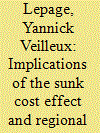

|
|
|
|
|
| Publication |
2013.
|
| Summary/Abstract |
Much of the literature on casualty sensitivity suggests that there is an inverse correlation between casualty levels and public support for war. It also suggests that a public will be more sensitive to local casualties. This article tests these pre-existing theses using data from Canada's participation in the war in southern Afghanistan between February 2006 and 2011. Studying the impact of both provincial and nationwide casualties, it finds no evidence to support these assumptions. Instead, this study finds strong indications that nationwide casualties led to a short-term increase in public support for the Afghan mission. This result is attributed to the sunk cost effect.
|
|
|
|
|
|
|
|
|
|
|
|
|
|
|
|
| 12 |
ID:
133889
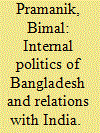

|
|
|
|
|
| Publication |
2014.
|
| Summary/Abstract |
In early 2013, political environment of Bangladesh more or less was against ruling AL Alliance. Public support was tilting towards Opposition. BNP exploited this situation and won five Corporation elections. In this situation, they went to hard bargaining for Care Taker Government (CTG). In fact, Bangladesh politics during the year of 2013 was largely guided by the difference between two main political parties BNP and AL. Ruling AL remained fixed to hold Jatiya Sansad Election under all party government headed by Prime Minister and BNP strongly wanted to hold election under non-party caretaker government.
|
|
|
|
|
|
|
|
|
|
|
|
|
|
|
|
| 13 |
ID:
133895
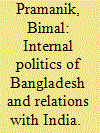

|
|
|
|
|
| Publication |
2014.
|
| Summary/Abstract |
In early 2013, political environment of Bangladesh more or less was against ruling AL Alliance. Public support was tilting towards Opposition. BNP exploited this situation and won five Corporation elections. In this situation, they went to hard bargaining for Care Taker Government (CTG). In fact, Bangladesh politics during the year of 2013 was largely guided by the difference between two main political parties BNP and AL. Ruling AL remained fixed to hold Jatiya Sansad Election under all party government headed by Prime Minister and BNP strongly wanted to hold election under non-party caretaker government.
|
|
|
|
|
|
|
|
|
|
|
|
|
|
|
|
| 14 |
ID:
126650
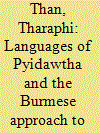

|
|
|
|
|
| Publication |
2013.
|
| Summary/Abstract |
Burma's first well known welfare plan was entitled Pyidawtha or Happy Land, and it was launched in 1952. In vernacular terms, the literal meaning of Pyidawtha is 'Prosperous Royal Country'. The government's attempt to sustain tradition and culture and to instil modern aspirations in its citizens was reflected in its choice of the word Pyidawtha. The Plan failed and its implications still overshadow the development framework of Burma. This paper discusses how the country's major decisions, including whether or not to join the Commonwealth, have been influenced by language; how the term and concept of 'development' were conceived; how the Burmese translation was coined to attract public support; and how the detailed planning was presented to the masses by the government. The paper also discusses the concerns and anxieties of the democratic government led by U Nu in introducing Burma's first major development plan to a war-torn and bitterly divided country, and why it eventually failed.
|
|
|
|
|
|
|
|
|
|
|
|
|
|
|
|
| 15 |
ID:
107662


|
|
|
|
|
| Publication |
2011.
|
| Summary/Abstract |
The Australian government and military have maintained humanitarian interventions for far longer than any comparable U.S. humanitarian intervention. This longevity confounds most traditional international relations theories. It seems that the key variable is public support for humanitarian interventions. The U.S. public quickly grew impatient with humanitarian operations, while the Australian public has not yet done so. Two reasons for the Australian public's forbearance are explored. First, the idea that the Australian military and government are proficient at these operations and that the public supports these operations because it "loves a winner" is found wanting. Second, innate differences between the United States and Australia, particularly regarding news media, are explored; these differences seem to be highly correlated with the longevity of the operations. It seems likely that the Australian public does not hear enough about these operations to be concerned about them or question their utility, efficacy, or cost.
|
|
|
|
|
|
|
|
|
|
|
|
|
|
|
|
| 16 |
ID:
104979
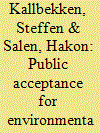

|
|
|
|
|
| Publication |
2011.
|
| Summary/Abstract |
While strongly recommended by economists, it has often been politically difficult to impose taxes on externalities. There is a substantial literature on public attitudes towards environmental taxes. There has, however, been few comprehensive attempts to understand attitudes towards environmental taxes.
The main research question in this paper is which factors influence support for fuel taxation. We propose a model of attitudes towards fuel taxation, and test this model as well as more specific hypotheses, using data from a representative survey of the adult Norwegian population.
Our results suggest that support for fuel taxation is best predicted by beliefs about environmental consequences, followed by beliefs about consequences to others. Beliefs about consequences to self (self-interest) is the factor that explains the least variation in support for fuel taxation.
The academically interesting result that support cannot be well explained without capturing a broad range of motivational factors is also highly policy relevant. It implies that there is no magic formula for increasing public support for environmental taxes. There are, however, some issues which can be addressed: trust in how well the government spends the revenue, and the perception that taxation does very little to change behaviour and thus to reduce environmental problems.
|
|
|
|
|
|
|
|
|
|
|
|
|
|
|
|
| 17 |
ID:
129609
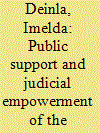

|
|
|
|
|
| Publication |
2014.
|
| Summary/Abstract |
Courts have become an increasing focus for political contestation in Southeast Asia. Yet little is known about the basis of their political power and legitimacy. Drawing on recent scholarship in the field of judicial politics, and presenting a case study of the Philippine Supreme Court after the transition to democracy in 1986, this article explores the conditions under which the Court has exercised its powers in the context of a democratizing state such as the Philippines. More specifically, it will show how strong public support has enabled the Court to exercise its judicial review powers and its authority over contending political actors. In drawing attention to the understudied link between public support and judicial assertiveness, the paper aims to advance existing scholarship by going beyond existing indicators of judicial independence and to provide new insights into the dynamics of evolving constitutional practice in the region through the interaction of the courts with the public.
|
|
|
|
|
|
|
|
|
|
|
|
|
|
|
|
| 18 |
ID:
152898
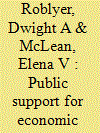

|
|
|
|
|
| Summary/Abstract |
What are the determinants of public support for the government’s foreign policy? We shed light on this question using experiments investigating public support for economic sanctions. Our results suggest that humanitarian concerns are associated with individuals’ decisions to support the use of sanctions against a target country. We find that high levels of public pain in the target country have a negative relationship with the likelihood of supporting sanctions, and tailored sanctions, which aim to shift damage from the targeted country’s population to its leadership, have a higher probability of support than comprehensive sanctions. At the same time, policy effectiveness shapes public support, but only indirectly—through individuals’ subjective evaluations rather than given estimates of policy success. When subjective evaluations of effectiveness are higher, sanctions receive more public support. Recalled effectiveness, on the other hand, has no direct effect on the decision to support the sanction policy.
|
|
|
|
|
|
|
|
|
|
|
|
|
|
|
|
| 19 |
ID:
180045
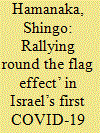

|
|
|
|
|
| Summary/Abstract |
This article analyzes the surge in support for PM Benjamin Netanyahu during the first wave of the coronavirus pandemic in Israel within the framework of the rally effect. Israel was chosen as a case study for two reasons. First, the country was repeatedly polled during the first wave of infection. Second, a strict compartmentalised lockdown limited to certain areas, as a natural experimentation, had been in place for some time. These two factors fresh important light on the circumstances under which a society supports its political leaders during a national crisis.
|
|
|
|
|
|
|
|
|
|
|
|
|
|
|
|
| 20 |
ID:
169727
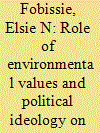

|
|
|
|
|
| Summary/Abstract |
The Ontario provincial government faces the challenge of getting public support in the implementation of its renewable energy (RE) policy. This paper therefore aims at investigating the effects of environmental values and political ideology on public support for renewable energy policy in Ottawa, Canada. Data was collected through open-ended interviews with 50 respondents in and around Ottawa, transcribed, coded and analysed using the NVivo software. Results indicate that environmental values and political ideology affect public support for renewable energy policy, but economic factors also play a role. There were 2 groups of people who felt neglected – those left out of the decision-making process and those who felt that they were excluded from the profits of RE projects in their areas of residence. Moving forward, the provincial government can think of ways to reduce the cost of electricity, invest on education and create awareness on the benefits of renewable energy and the different initiatives offered by the RE policy to increase public support. Public ownership of RE projects and more democratic policy-making could also increase public support.
|
|
|
|
|
|
|
|
|
|
|
|
|
|
|
|
|
|
|
|
|